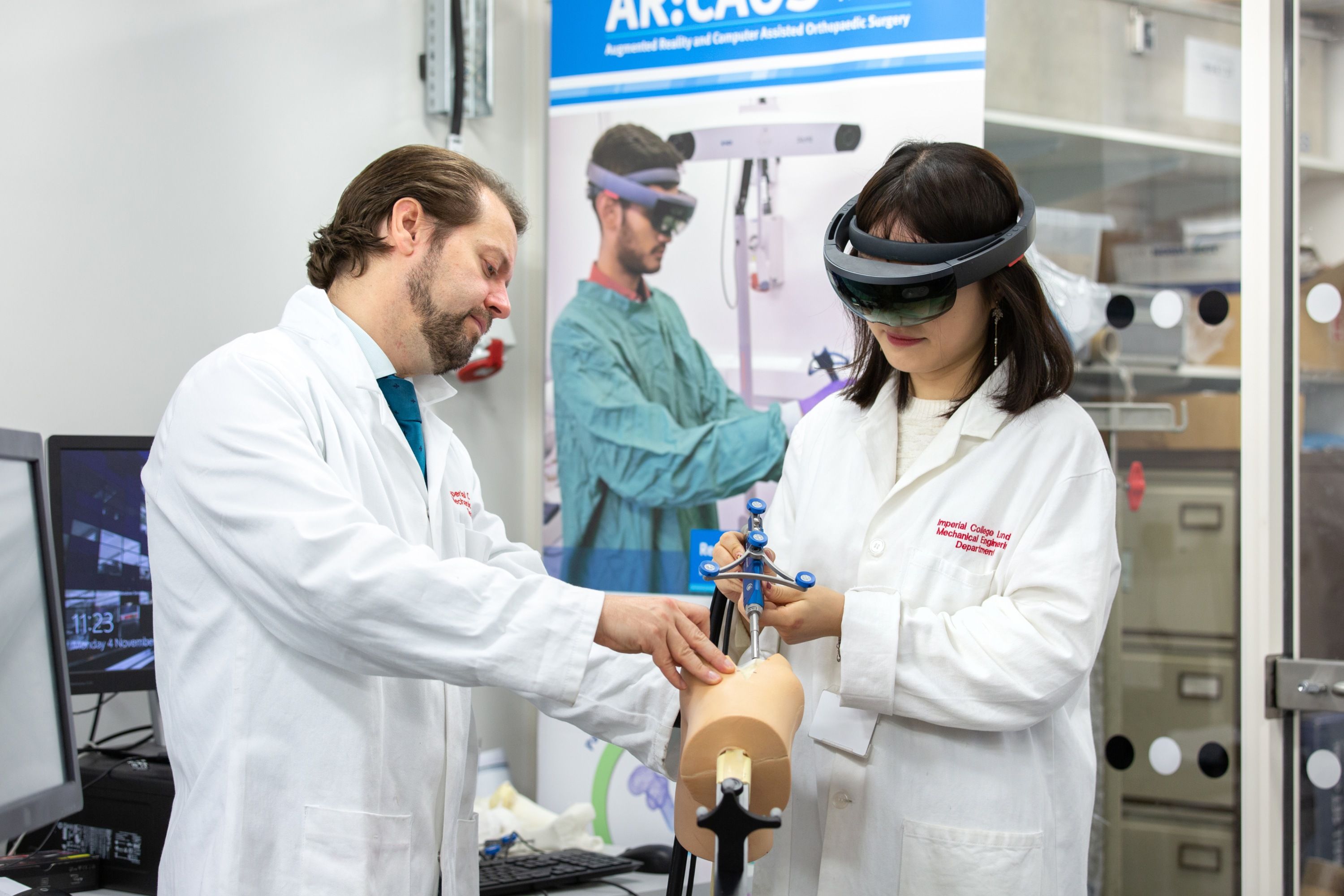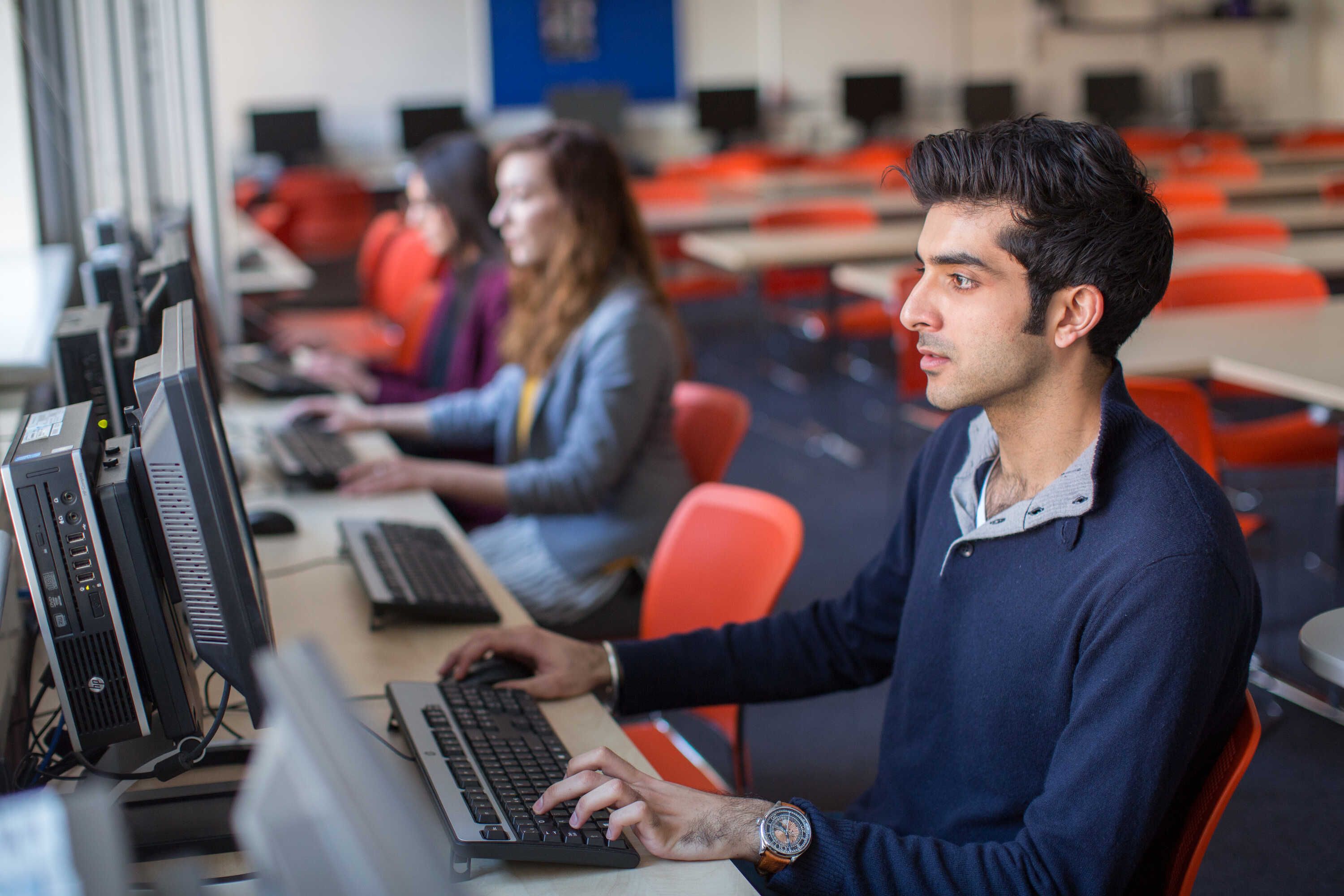
Medical Robotics and Image-Guided Intervention
Gain the research experience required to work within the innovative field of medical robotics and surgical imaging
Gain the research experience required to work within the innovative field of medical robotics and surgical imaging
Develop your expertise in a renowned centre for imaging, sensing and robotics
Apply your skills in a cutting-edge experimental research project
Course key facts
-
Qualification
-
MRes
-
-
Duration
1 year
-
Start date
September 2025
-
Study mode
Full-time
-
Fees
£15,200 Home
£45,000 Overseas
-
Delivered by
-
Location
-
South Kensington
-
Minimum entry standard
-
2:1 in Science, Engineering, Biomedical Science or Medicine
Course overview
Explore two of the fastest growing technology-driven areas of medicine on this Master's course.
Medical Robotics and Image-Guided Interventions have experienced significant growth over the last twenty years.
This multidisciplinary course runs through the current technology used in clinical work and new technological advances in the field.
With teaching led by internationally-renowned departments at Imperial, you'll explore topics including medical robotics and instrumentation, minimally invasive surgery and image guided intervention.
You'll build experience in conducting research with application to clinical medicine and surgery, and develop the expertise required for further study or a career within industry.
You'll also apply skills acquired from the course to an eight-month cutting edge research project.
Get a sneak preview of the facilities available to our students.
Structure
This page is updated regularly to reflect the latest version of the curriculum. However, this information is subject to change.
Find out more about potential course changes.
Please note: it may not always be possible to take specific combinations of modules due to timetabling conflicts. For confirmation, please check with the relevant department.
You’ll take all of these core modules.
Core modules
Work in small groups to develop a device or system that is relevant to Medical Robotics and/or Image Guided Intervention.
Your work is assessed via a written inception report and via a final project presentation.
Build your foundational knowledge of image-guided intervention and analyse common image processing and analysis methods.
Become familiar with the underpinning technologies and applications of robotic surgery, as well as the detailed mechanical principles, kinematics, and control theory involved.
Develop your appreciation of key surgical disciplines and assess the current practice and the evolution of minimally invasive surgery and surgical robots.
Explore the concept of neuroergonomics, the underlying neural, sensing and perceptual functions of our brain, and how these inspired the development of autonomic sensing and robotic systems.
Assess the different medical and surgical imaging methods in common use and explore the use of optical technology in endoscopy.
Your individual project begins at the start of the second term and continues through to the end of your degree.
Research projects can be taken at Imperial, where you are assigned an academic supervisor, or at an institution other than Imperial, in which case you are assigned one supervisor from the college and another from the host institution.
Your project will be assessed through a poster presentation, oral presentation and written dissertation.
Teaching and assessment
Balance of teaching and learning
Key
- Lectures, classes and group project work
- Independent study
- Individual project work
- 12% Lectures, classes and group project work
- 22% Independent study
- 66% Individual project work
Teaching and learning methods
-
Lectures
-
Tutorials
-
Group research
Balance of assessment
Key
- Examinations
- Oral/poster presentation
- Written report/coursework
- 10% Examinations
- 26% Oral/poster presentation
- 64% Written report/coursework
Assessment methods
-
Analysis of results (strength and validity of findings)
-
Computational work packages
-
Group research project
-
Individual project
-
Presentations
-
Report writing
Entry requirements
We consider all applicants on an individual basis, welcoming students from all over the world.
How to apply
Apply online
You can submit one application form per year of entry. You can choose up to two courses.
There is no application fee for MRes courses, Postgraduate Certificates, Postgraduate Diplomas, or courses such as PhDs and EngDs.
If you are applying for a taught Master’s course, you will need to pay an application fee before submitting your application.
The fee applies per application and not per course.
- £80 for all taught Master's applications, excluding those to the Imperial College Business School.
- £100 for all MSc applications to the Imperial College Business School.
- £150 for all MBA applications to the Imperial College Business School.
If you are facing financial hardship and are unable to pay the application fee, we encourage you to apply for our application fee waiver.
Find out more about how to apply for a Master's course, including references and personal statements.
An ATAS certificate is not required for students applying for this course.
Tuition fees
Home fee
2025 entry
£15,200
You should expect and budget for your fees to increase each year.
Your fee is based on the year you enter the university, not your year of study. This means that if you repeat a year or resume your studies after an interruption, your fees will only increase by the amount linked to inflation.
Find out more about our tuition fees payment terms, including how inflationary increases are applied to your tuition fees in subsequent years of study.
Whether you pay the Home or Overseas fee depends on your fee status. This is assessed based on UK Government legislation and includes things like where you live and your nationality or residency status. Find out how we assess your fee status.
If you're a UK national, or EU national with settled or pre-settled status under the EU Settlement Scheme, you may be able to apply for a Postgraduate Master’s Loan from the UK government, if you meet certain criteria.
For courses starting on or after 1 August 2024, the maximum amount is £12,471.
The loan is not means-tested and you can choose whether to put it towards your tuition fees or living costs.
Overseas fee
2025 entry
£45,000
You should expect and budget for your fees to increase each year.
Your fee is based on the year you enter the university, not your year of study. This means that if you repeat a year or resume your studies after an interruption, your fees will only increase by the amount linked to inflation.
Find out more about our tuition fees payment terms, including how inflationary increases are applied to your tuition fees in subsequent years of study.
Whether you pay the Home or Overseas fee depends on your fee status. This is assessed based on UK Government legislation and includes things like where you live and your nationality or residency status. Find out how we assess your fee status.
If you're a UK national, or EU national with settled or pre-settled status under the EU Settlement Scheme, you may be able to apply for a Postgraduate Master’s Loan from the UK government, if you meet certain criteria.
For courses starting on or after 1 August 2024, the maximum amount is £12,471.
The loan is not means-tested and you can choose whether to put it towards your tuition fees or living costs.
Scholarships
The Dean’s Master’s Scholarships
Value per award
- £10,000
Who it's for
- All students applying to study a Faculty of Medicine Master’s course
The Dr Jean Alero Thomas Scholarships
Value per award
- Partial or full tuition fee at the Home rate
Who it's for
- All students applying to study a Faculty of Medicine lab-based Master’s course
How will studying at Imperial help my career?
Develop a range of advanced research skills, valued in both academia and industry.
The Hamlyn Centre has a world-leading reputation for its translational research quality.
You will be well prepared to pursue further study at PhD level.
With specialised knowledge, you'll be highly sought after in a range of sectors.
Common career paths include a career in medical technology, research or robotics.
Further links
Contact the department
Email: a.marsh@imperial.ac.uk
Course Administrator: Alex Marsh
Course Director: Professor Daniel Elson
Visit the Hamlyn Centre website.

Register your interest
Stay up to date on news, events, scholarship opportunities and information related to this course.

Events, tasters and talks
Meet us and find out more about studying at Imperial.

Terms and conditions
There are some important pieces of information you should be aware of when applying to Imperial. These include key information about your tuition fees, funding, visas, accommodation and more.
You can find further information about your course, including degree classifications, regulations, progression and awards in the programme specification for your course.
Programme specifications